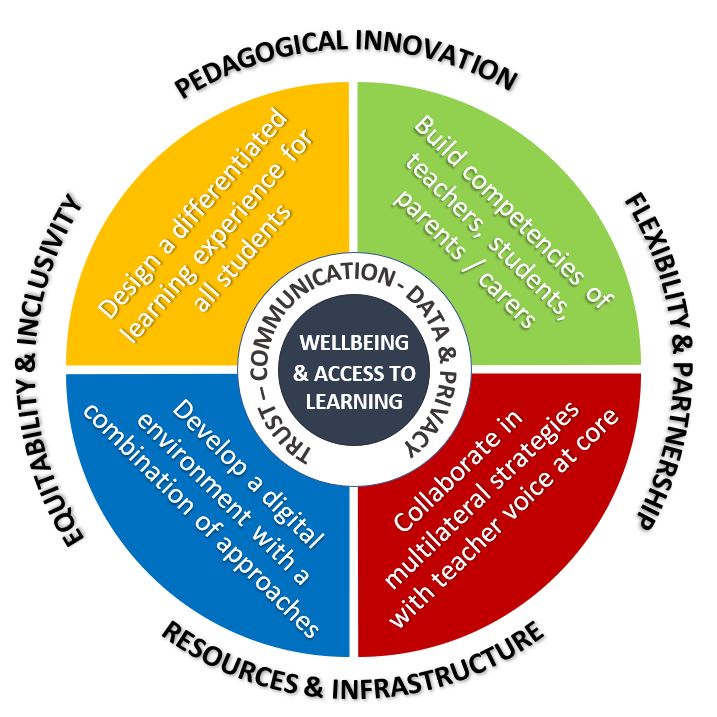You are here
- Home
- Key themes emerging from the qualitative pilot study
Key themes emerging from the qualitative pilot study
Over March and April 2021, a pilot study of ten qualitative interviews was carried out with headteachers and CEOs of multi-academy trusts. 10 interviews have provided a rich and detailed information set on how school are leading online learning, pre, due and post Covid-18. Here are some of the key themes that have emerged from the pilot study.
Wellbeing and access to learning
Without good health and wellbeing, young people’s learning is adversely impacted ([1], [2], [3], [4]). During lockdown 1, there was a marked prioritization on care, compassion and communication - between schools, pupils and parents. Teachers’ first priority over anything else during the pandemic has been ensuring pupils’ health, wellbeing and safety. Schools are a significant agency in their community, expanding care to be both personal and social care when pupils were at risk during lockdown. Schools were a collaborative agency and expanded their role during Covid-19, which will continue. Schools went beyond checking if pupils were ok, to academic and personal care – online access enabled this.
Trust
Trust throughout the educational system is key to a multilateral approach with teachers at the core. In a crisis, such as a global pandemic, collective decision making and collaborative working are vital. Effective teaching and learning take place when school leaders trust their teachers to know their pupils and address the learning needs of their pupils. What is key, according to the school leaders interviewed during the pilot, is that teachers are supported, trained and provided with the resources they need to deliver learning online ([5]).
Schools have dedicated a lot of their time building and maintaining trust with parents and carers through weekly calls and sometimes daily calls and home visits. 1000s of calls have been made by schools. With the constant changes during Covid-19, communication has been key in maintaining trust. utilising a range of communication mechanisms including the school website, newsletters, meetings on the learning platform, telephone calls and schools visits.
It was reported that pupils did not like learning from external resources, such as, The Oak Academy, because it wasn’t their teacher and someone they were familiar with. Pupils did not trust someone they did not know, to be delivering their class.
During the first lockdown, there was a lack of trust in the systems being utilised. Schools had to do a lot of work in checking what systems could do ensuring data privacy and safeguarding. They did not know if recording was permitted. By the time the second lockdown arrived, schools were much more confident in utilising learning platforms, such as, Google Classroom and Microsoft Teams and could provide a much better offering of online learning.
Differentiated learning experiences
The pilot study has shown how online lessons can lead to more inclusive and equitable approaches in the future for addressing social justice, for example, school leaders reported SEND pupils had better provision during Covid-19 than before. Online has provided more personalised provision, reimaging schooling with Teaching Assistants providing live one-to-one support when needed in an online breakout room. Online learning has enabled schools to address their blind spot / intolerance for pupils who do not find school works for them in the one size fits all model and some schools have been exploring the use of artificial intelligence for better differentiation. A new kind of pedagogy is required to create successful online or technologically supported learning environments. Teaching online is an entirely new pedagogy to teaching face-to-face
Building competencies
A key strategy in addressing inequality gaps is to build the online learning competencies of parents in order for them to support their children in home learning ([6]). Key to this is communicating and building relationships between parents / carers and the school ([7]). Schools have been delivering online training for parents and inviting them to use their IT labs.
It is a cause of stress if teachers are having to use technology that they do not feel competent in using ([8]). Training delivered via online webinars ([9]) can support teaching and support staff in how to clearly explain and effectively scaffold and provide feedback when delivering online ([10]). At the start of lockdown 1, some teachers found it difficult to switch to online pedagogy and experienced teaching online as a heavy burden which was stressful and caused negative feelings because they did not have the technical skillset ([11]). Pittman and Gaines ([12]) in their research found the major barriers impacting teachers’ ability to use and integrate technology enhanced learning in their teaching was a lack of time to get to grips with technology and a lack of support in being able to learn and experiment in using technology in ways to support pedagogy. Teachers need preparation time to design online learning, curate and create online materials and formative feedback and assessment.
Effective professional learning is targeted, ongoing, differentiated, carefully planned and has a balance of high support and high challenge ([5])
Digital Environments
Developing a digital environment with a combination of approaches is vital. As part of the school’s digital strategy, a number of elements need to be consider including hardware, software, networks, learning platforms and digital content resources. School leaders need to determine how their school provides an online environment for successful teaching and learning. As part of the digital environment, schools need to have policies in place to define how the digital facilities are utilised, supported and data protected. Also, how staff and learners are trained and will be supported in using both school’s issued kit and their own devices. Consideration must also be given to social and teaching spaces and how they support the use of digital technology for teaching and learning.
Collaborative partnerships
Headteachers and CEOs of multi-academy trusts (MATs) report that online learning provides an opportunity to offer a wider curriculum for GCSE and Sixth form students. Where running a small class was not viable, eg, if a small group wanted to study Spanish, online learning enables schools to collaborate to run the curriculum online across more than one school.
It was also reported that there are inevitable clashes with timetables and pupils can’t always choose the subjects they want to study. With online learning, it is possible for students to study one of their subjects online so that they can study what they want and avoid timetable clashes.
Covid-19 has led to much more collaborative working across schools. Headteachers and CEOs of MATs have teamed together to share problems and work out solutions collectively. Using online platforms has enabled discussions to take place more easily. Teaching staff are sharing resources online and collaboratively sharing the workload of producing digital resources. Multi-lateral collaborative partnerships across sectors are being seen with teacher and student voice as part of the solution. The scale requires all stakeholders to be involved – government agencies, technology professionals, teachers in continuous dialogue and tech organisations, such as Google, Microsoft and Apple.
Framework
The pilot research has revealed some interesting findings that will be taken forward into the main phase. It has also resulted in a theoretical framework for our research. This is illustrated in figure 1.

Figure 1 Theoretical Framework taken from Jewitt et al ([13])
As can be seen in the framework, we place well-being and access to learning as central to the future development of digital innovation in secondary schools. The second part of our framework includes designing of a differentiated learning experience for students; the importance of building the competencies of teachers students, parents, and carers; collaboration in multilateral strategies with teacher voice at the core and developing a digital environment via a combination of approaches. We look forward to continuing our reporting on the project which will give rise to a free online course for school leaders hosted on the open University’s open learning platform.
References
[1] Asbury, K., Fox, L., Code, A. and Tosseb, U. (2020) How is Covid-19 affecting the mental health of children with special educational needs and disabilities and their families? Journal of Autism and Developmental Disorders https://doi.org/10.1007/s10803-020-04577-2
[2] Dorn, E., Hancock, B., Sarakatsannis, J and Ciruleg, E. Covid-19 and student learning in the United States: The hurt could last a lifetime, 2020. Retrieved from: https://fresnostate.edu/kremen/about/centers-projects/weltycenter/documents/COVID-19-and-student-learning-in-the-United-States-FINAL.pdf
[3] Kuhfeld, M. Soland, J. Tarasawa, B., Johnson, A., Ruzek, E. and Liu, J. (2020) Projecting the potential impacts of Covid-19 school closures on academic achievement 2020. Retrieved from: https://www.edworkingpapers.com/sites/default/files/ai20-226-v2.pdf
[4] Lee, J. Mental health effects of school closures during Covid-19. The Lancet. Child and Adolescent Health 4 (6) 421, 2020.
[5] Netolicky, D. M. Transformation professional learning: Making a difference in schools Abingdon, Routledge, 2020.
[6] Cullinane, C and Montacute, R., Covid-19 and Social Mobility Impact Brief #1: School Closures 2020. Retrieved from: https://www.suttontrust.com/our-research/covid-19-and-social-mobility-impact-brief
[7] Hampden-Thompson, G. and Galindo, C. School-family relationships, school satisfaction and the academic achievement of young people. Educational Review, 69 (2), 248 – 265. 2017.
[8] Al-Fudail, M. and Mellar, H. Investigating teacher stress when using technology Computer and Education, 51, 1103 – 1110, 2008.
[9] Department for Education Guidance: Remote education webinars, 2020. Retrieved from: https://www.gov.uk/guidance/remote-education-webinars
[10] Education Endowment Foundation, Impact of school closure on the attainment gap: Rapid evidence assessment. EEF, 2020. Retrived from: https://educationendowmentfoundation.org.uk/public/files/EEF_(2020)_-_Impact_of_School_Closures_on_the_Attainment_Gap.pdf
[11] Quezada, R. L., Talbot, C. and Quezada-Parker, K. B. From bricks and mortar to remote teaching: a teacher education programme’s response to Covid-19. Journal of Education for Teaching, 42 (4) pp., 472 – 483, 2020.
[12] &ittman, T. and Gaines, T, Technology integration in third, fourth and fifth grade classrooms in Florida school district Educational Technology Research and Development 63, 539 – 554, 2015.
[13] Jewitt K, E., Baxter J, A. and Floyd A. Literature review on the use of online and blended learning during Covid 19 and Beyond. Milton Keynes: The Open University, 2021.
Dr Katharine Jewitt
Dr Katharine Jewitt is a Research Fellow and Lecturer at The Open University. She is Fellow of The Higher Education Academy, Fellow of the Royal Society for the encouragement of Arts, Manufactures & Commerce, Fellow of the Society for Education and Training and Certified Member of the Association for Learning Technology (CMALT). She is the Administrator of the Association for Learning Development in Higher Education (ALDinHE) and former Chair of the Evaluation of Learners’ Experiences of e-learning Special Interest Group (ELESIG) and the UK Digital Learning Community of Practice.
Dr Jewitt has won several awards, including the SEDA-PDF Institutional Change Leader Award in 2016, supported by Jisc and appointed as a Microsoft Innovator Education Expert (MIEE) in 2015. She is recognised in the 2020 Edtech 50 Year book as "one to watch" in building the Edtech UK sector and listed in the 2019 periodic table of Further Education Educators on Twitter. She was voted in the Top 50 social media users by Jisc and shortlisted for The Education Technology Association (NAACE) Impact Awards for Leadership Impact in 2016.
Dr Jewitt’s research interests focus on how technology enhanced learning can help people to develop key life skills and realise their full potential. For her PhD research, she worked with SMEs to use virtual reality to support apprentices’ work-based learning developing a three-way partnership between education provider, SME and apprentice. Her current research focuses on the strategic management of online learning in secondary schools during and beyond Covid19. Dr Jewitt is based in the department of Public Leadership and Social Enterprise (PULSE) at the Open University Business School.
Upcoming Events
No events
